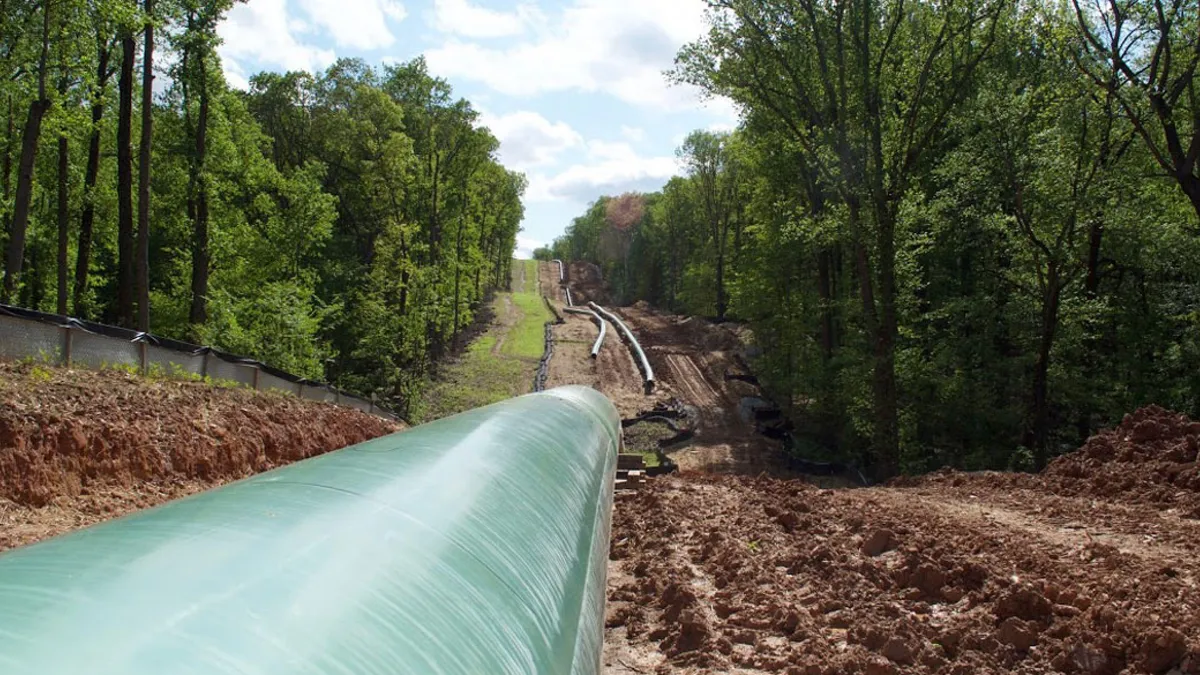Dive Brief:
- House Republicans and the fossil fuel industry are opposed to legislation directing the Federal Energy Regulatory Commission to develop reliability and cybersecurity standards for natural gas and other energy pipelines. Trade groups and conservative lawmakers argue the bill is duplicative, costly and creates conflicting authorities.
- The House Subcommittee on Energy held a Wednesday hearing to consider H.R. 6084, the Energy Product Reliability Act. There are no mandatory reliability standards for gas pipelines and that "poses a risk to the reliability of the bulk power system," FERC Chairman Richard Glick told lawmakers.
- The Interstate Natural Gas Association of America (INGAA) and seven other groups object to the bill, pushing instead for lawmakers to address "capacity constraints resulting from federal and state permitting obstacles." Republican lawmakers say their priority is to slow rising energy costs.
Dive Insight:
There are now 93 FERC-approved mandatory reliability standards for the bulk power system, but none for gas and other pipelines moving energy. HR 6084 is similar to parts of the Energy Policy Act of 2005, which called for the development of reliability standards for the power grid now overseen by the North American Electric Reliability Corp. (NERC).
Gas made up 37% of U.S. electricity generation in 2021, Glick told lawmakers. If a pipeline failure or cyber attack disrupts gas supplies, then "electric generation capacity dependent on that pipeline could be lost, possibly leading to blackouts on the electric grid," he said.
"This is more than a hypothetical situation," he added, pointing to Winter Storm Uri, which last year caused blackouts in Texas and the South Central U.S. when gas production facilities froze, among other weather-related impacts. A joint FERC-NERC report in November recommended Congress designate a single federal agency with authority over pipeline reliability.
The ransomware attack on Colonial Pipeline in May of 2021 also highlighted the risks, said Glick. In that instance, the largest oil pipeline on the East Coast shut down preemptively to keep malware from infecting its operational systems.
"A similar attack against a natural gas pipeline serving electric generators has the potential to also impair the reliability of the electric grid," Glick said. "In my view, it is critical that energy pipelines also be subject to mandatory cybersecurity standards."
HR 6084 was introduced by Rep. Bobby Rush, D-Ill., who said at the hearing the bill is "not final" and that he is open to "constructive suggestions" from Republicans. "Electric reliability is an issue that we're all for," he noted.
HR 6084 calls for the creation and certification of an energy product reliability organization, and gives FERC the authority to order the organization to develop new reliability standards. The reliability organization would also be able to issue emergency standards, and FERC would have authority to review enforcement actions and to independently investigate and penalize reliability violations.
The legislation will help to "better secure the reliability of our nation's energy infrastructure, in the face of threats, extreme weather and cyber attacks," Glick said.
Republicans and the gas industry argued oversight by FERC is unnecessary and duplicative. The Transportation Security Administration oversees the physical security of pipelines because they transport fuel, gas and chemicals, and in 2021 announced cybersecurity directives as well.
"The bill today that we're going to be talking about is a sweeping power grab preempting states and local jurisdictions from regulating all types of energy infrastructure," Rep. Fred Upton, R-Mich., said. "This bill would dramatically expand FERC, transforming a relatively tiny agency into a behemoth."
This bill would also "impose new federal taxes, fees and regulations on all energy in the country," he said.
Fossil fuel groups say there is already sufficient regulation on pipelines. INGAA, the American Gas Association, the American Petroleum Institute, the American Public Gas Association and others lodged their concerns in a Dec. 7 letter to lawmakers and issued a statement following Wednesday's hearing.
HR 6084 "not only creates duplicative and conflicting federal oversight authority, but it also interferes with state regulation of intrastate pipelines," the groups said in their letter. "From the natural gas perspective, FERC does not have authority over intrastate natural gas transmission pipeline systems or the natural gas distribution pipeline systems that local distribution companies operate."















